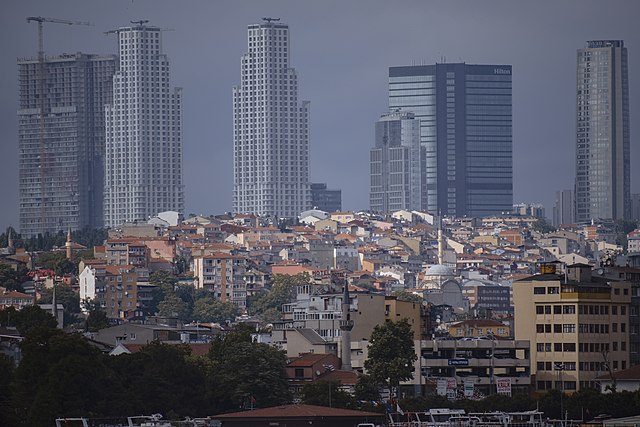As the republic marks its 100th anniversary, the journal offers incisive analyses of Erdoğan’s actions since his narrow re-election, how the country’s eastern orientation has affected its reactions to the Ukraine war, and Ankara’s struggles with nonstate actors over suicide terrorism and nuclear security.
The Republic of Turkey turned 100 this fall, though it did not celebrate in the high style one might expect. While some see the Gaza war as blunting the potential excitement, others note that President Recep Tayyip Erdoğan and his allies do not fully embrace the secular legacy and orientation toward the West associated with the founder of the modern state, Mustafa Kemal Atatürk. The new edition of Middle East Policy features four articles that analyze the many tensions at play as Turkey heads into its second centennial.
Since narrowly holding onto power in the May runoff, Erdoğan has tried to re-establish ties with the West and avert disasters foreign and domestic, from a currency crisis to flareups in the border conflict with the militant Kurdistan Workers’ Party (PKK), conflict over Sweden’s accession to NATO, and trying to mediate between East and West in reaction to the Ukraine war.
Over the past week, Turkey has punished hundreds with alleged ties to the PKK, including detaining nearly 100 people on charges of spreading propaganda while freezing the in-country assets of another 80 individuals and organizations for potentially funding terrorist activities. These moves follow an October suicide bombing outside the Interior Ministry building in Ankara that wounded two police officers. The PKK later claimed responsibility. Concerns about the group have also led Turkey to hold up Sweden’s request to join NATO, made in the wake of Russia’s Ukraine invasion. Ankara has sought stronger restrictions on the Kurdish militant group, prompting a new antiterrorism bill from the Swedish parliament; ratification is expected soon.
The 158th issue of Middle East Policy, available in an early view, examines issues of vital interest in Turkey’s centennial year. Erdoğan faces more domestic battles in the months ahead as he combats economic woes and prepares for the March municipal elections. He must also continue to hedge between global power centers while continuing to track threats from nonstate groups. Here are the takeaways from these four new articles:
Erdoğan’s Bid to Re-Establish Dominance After His Pyrrhic Victory, by Nihat Ali Özcan and Pınar İpek.
- Erdoğan appears to have dramatically shifted toward pragmatism and the West after a narrow re-election, as he now faces the realities of mounting economic and security challenges, as well as democratic backsliding.
- However, the article shows, the president is still mostly focused on winning the 2024 municipal elections and holding onto power past the next presidential vote, in 2028.
- Despite the recent U-turns in economic and foreign policy, the authors contend, Erdoğan may not hold to these changes, it is unclear whether there are true shifts in foreign policy, and previous damage to the country’s institutions makes it difficult for him to solve problems.
Explaining the Decline of Suicide Terrorism in Turkey, by Sertif Demir and Murat Ülgül
- Since 2016, Turkey has experienced a marked decline in suicide terrorism, a tactic that militant groups like the PKK and Islamic State had employed with some frequency over the previous 20 years.
- The article identifies three factors in reducing suicide attacks before a minor incident in October 2023:
- the introduction of new antiterrorism concepts and technologies
- fears among terror groups that they will lose legitimacy in the eyes of supporters or foreign public opinion
- changes in the international environment.
The Impact of Eurasianism on Turkey’s Role in the Ukraine War, by Göktürk Tüysüzoğlu
- Turkey has tried to act as a mediator in the war and to avoid taking sides between Moscow, an important partner, and the West, where Ankara aspires to further European integration.
- In seeking benefits from Russia and China, as well as the West, Turkey has employed a hedging strategy.
- The article shows that this strategy is driven not just by economic and security needs but by Eurasianism, a general orientation toward the East. Eurasianism has deep historical roots and has many flavors, with subtle differences across the ideological spectrum.
Turkey’s Nuclear Security Regime: An Assessment, by Şebnem Udum
- In the wake of the 9/11 attacks, states were made to develop new systems of security, particularly around their nuclear programs. Turkey, as a newcomer to nuclear energy, is susceptible to the dangers posed by nonstate actors, including the theft of targeting of nuclear materials and facilities.
- Recognizing this weakness, Ankara has begun to reform its nuclear security regime. This article identifies the areas of stakeholder cooperation, training and education, and nuclear security culture as the main areas where further work is needed, and offers insight into what actions the state should take to create an effective nuclear security regime.
